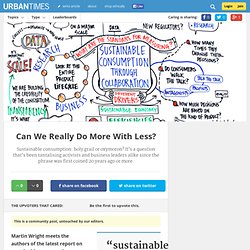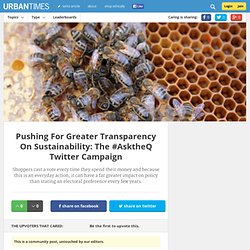

Maastricht Week of Entrepeneurship '12 - mark your calendar. Virtual Fair & Careers Fairs. Economists, Scientists Debate Research Efficiency. Economists, Scientists Debate Research Efficiency Tanya Lewis In a series of comments in Nature, economists suggest ways to reduce financial inefficiency in academic research, but some researchers don’t believe science should be managed like a business.

In today’s economic climate, academic institutions are seeking to maximize their investment in research. While financial and productivity experts agree that inefficiencies exist within the system, their suggestions for improvement vary. Last week, Nature published three commentaries (1–3) on research efficiency by authors from academia and consulting. WE'RE BLOWN AWAY: This Startup Could Literally Change The Entire Software Industry. Marital Prenups? A Look at CEO Severance Agreements by Peggy Huang.
Companies pull ads from Muslim reality TV show. Iain Macadair Twitter. Un nouveau modèle de consommation. Dernière mise à jour: 05-12-2011 | 11h51 Il s'agit de jeunes sociétés internet s'adressant à ceux qui préfèrent se prêter des voitures plutôt que de les posséder, séjourner dans une chambre familiale désertée plutôt que dans des hôtels ou lever des fonds auprès d'amis plutôt qu'auprès des banques.

«Nous sommes au cœur d'une révolution de la propriété», affirme Rachel Botsman, auteur du livre What's Mine is Yours qui illustre le basculement vers un modèle de «consommation en collaboration». «Nous ne voulons pas de DVD, nous voulons de la musique», ajoute Mme Botsman. «Nous ne voulons pas de voiture, nous voulons aller d'un point A à un point B.
C'est l'avènement d'une génération qui a un rapport très différent à la propriété», affirme-t-elle. Partage De jeunes pousses comme Zimride, TaskRabbit ou Airbnb capitalisent sur cette tendance en fournissant des services permettant respectivement de partager des trajets en voiture, des tâches ménagères ou des chambres vides. Service en ligne. S 12 Consumer Trends for 2012. Introduction | This year, much as in previous years, some brands may be staring into the abyss, while others will do exuberantly well.

And while we can’t offer any help to defaulting nations or bankrupt companies, we do believe that there are more opportunities than ever for creative brands and entrepreneurs to deliver on changing consumer needs. From Canada to Korea. Hence this overview of 12 must-know consumer trends (in random order) for you to run with in the next 12 months. Onwards and upwards: Gamify Your Company Website with Our Gamification API. Apple, la tyrannie du cool.
Apple: The Numbers [Infographic] World’s largest tech company: check.
![Apple: The Numbers [Infographic]](http://cdn.pearltrees.com/s/pic/th/apple-numbers-infographic-40442454)
Larger than Microsoft and Google combined: check. World’s largest company by market cap: check. But how? We all know that iPhones, iPads, iPods, Apps and Apple computers all sell like hotcakes globally – but a look at the numbers provides a staggering realisation. Reddit-chart-illusion-choice.png (PNG Image, 960x568 pixels) Envisioningtech1. Free Visio BPMN, Free Visio BPMN 2.0. Simple process authoring within Visio using the most recognized business process notation standard.

Startersdag zaterdag 3 november. Microsoft Xbox 720 Presentation. Can We Really Do More With Less? This is a community post, untouched by our editors. sustainable consumption… in reality, it comes down to price and quality almost every time Tweet Share Martin Wright meets the authors of the latest report on sustainable consumption.

Sustainable consumption: holy grail or oxymoron? Welcome to the Anthropocene. Watch 131 Years of Global Warming in 26 Seconds. Don't Have Flash?

Watch this video on your iPad or iPhone here While temperatures soared for many this summer, this video takes the longer historical view. It comes to us from our friends at NASA and is an amazing 26-second animation depicting how temperatures around the globe have warmed since 1880. That year is what scientists call the beginning of the “modern record.” You’ll note an acceleration of those temperatures in the late 1970s as greenhouse gas emissions from energy production increased worldwide and clean air laws reduced emissions of pollutants that had a cooling effect on the climate, and thus were masking some of the global warming signal. The data come from NASA's Goddard Institute for Space Studies in New York, which monitors global surface temperatures. Pushing for Greater Transparency on Sustainability: the #AsktheQ Twitter Campaign.
This is a community post, untouched by our editors. via Anya Hart Dyke In a nutshell, the #AsktheQ campaign aims to bring pressure to bear on all sectors to improve their regard for the environment.

Tweet Share Shoppers cast a vote every time they spend their money and because this is an everyday action, it can have a far greater impact on policy than stating an electoral preference every few years. As the influence of social media grows, consumers have an unprecedented opportunity to share concerns with thousands of people about governmental and corporate failure to protect our environment. Geoengineering: Risky to Do, Riskier to Ignore.
This is a community post, untouched by our editors.

I’ve got to admit I’m not the world’s biggest fan of geoengineering, and I’ve said so quite publicly. The idea is that if we fail to cut back greenhouse gas emissions and the planet’s temperature soars to potentially dangerous levels, we’ll have to do something. Since greenhouse gases trap heat from the sun, that something could be finding a way to block sunlight — by lofting particles of reflective sulfur dioxide up into the stratosphere, for example, or by “seeding” clouds with a fine spray of seawater to make them whiter, or even, in one of the more farfetched schemes I’ve heard about, by sending little mirrors into space. Or, since CO2 stays in the atmosphere for hundreds of years after its emitted, the something could be a new technology, like “artificial trees,” which would suck that most important greenhouse gas back out of the air.
A Little SPF Spray for Earth? This is a community post, untouched by our editors.

While there have been some amazing social advances that have resulted from technology developed over the past century, these advances have come at a price; a price too high for our environment to sustain. Our growing demands are beginning to take their toll on the earth, and the effects of global climate change are becoming increasingly apparent. It is evident, now more than ever, that we must take drastic measures to control and reverse the negative impacts we have inflicted on our environment. Widespread complacency in the behaviours that epitomize our disposable society has resulted in incredibly unsustainable lifestyles, and practices that have put great strains on our Earth.
Reducing greenhouse gas emissions, and achieving a carbon neutral or carbon negative state, is a major determining factor in just how much we will be impacted by global climate change in the coming years. Making the Chocolate Last. This is a community post, untouched by our editors. Cocoa harvests are shrinking, but The Cocoa Parternship, launched by Cadbury, is bringing stakeholders together to restore them and ensure a healthy crop in years to come. Plaza de secado (drying plaza). Woman collecting some cocoa away from the sun. Top 5 Noteworthy Responses to Sustainability Campaign #AsktheQ.
Top 5 Holiday Questions for the Sustainably Minded. Newsletter August 22 is Earth Overshoot Day - Footprint Network News. Dear Global Footprint Network friends, Today, August 22, is Earth Overshoot Day, marking the date when humanity has exhausted nature’s budget for the year. We are now operating in overdraft. For the rest of the year, we will maintain our ecological deficit by drawing down local resource stocks and accumulating carbon dioxide in the atmosphere. Earth Overshoot Day (from a concept devised by the UK think tank new economics foundation) helps conceptualize the gap between what nature can regenerate, and how much is required to support human activities.
Similar to the way a bank statement tracks income against expenditures, Global Footprint Network tracks humanity’s demand for, and supply of, natural resources and ecological services. Sociale Innovatie. What the heck is arbejdsglaede!? PNA Group. OKE4U.